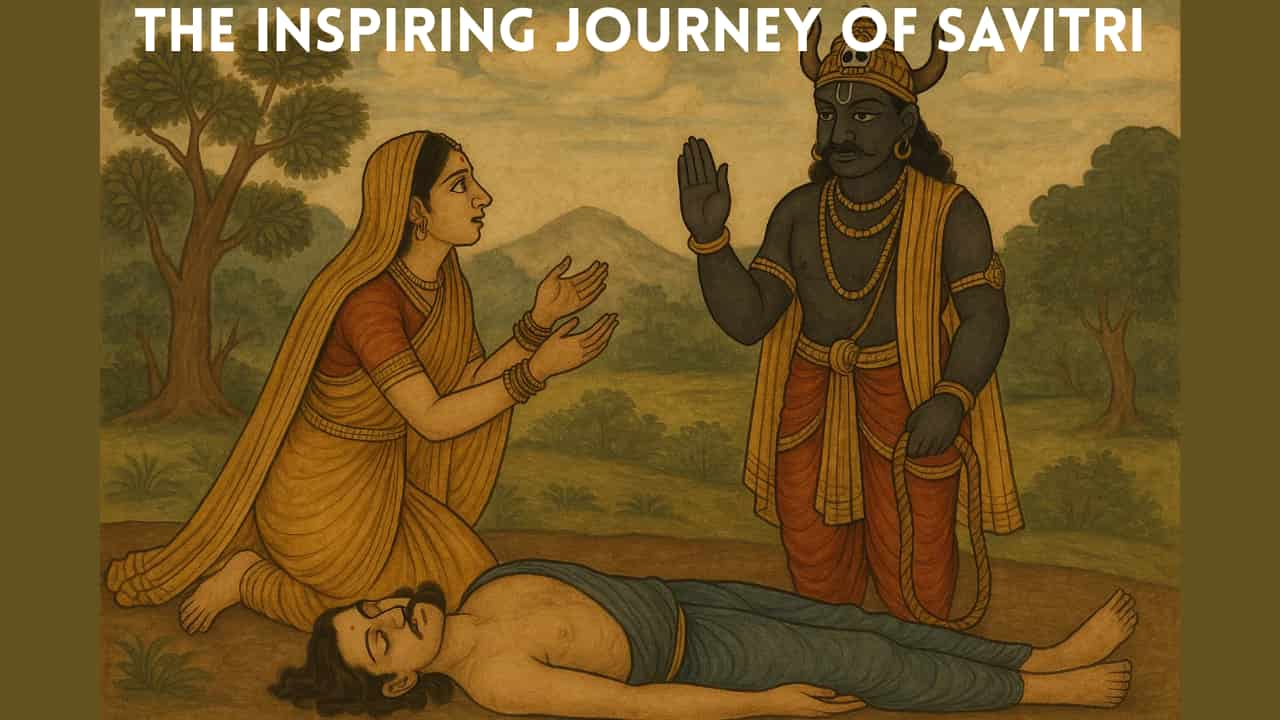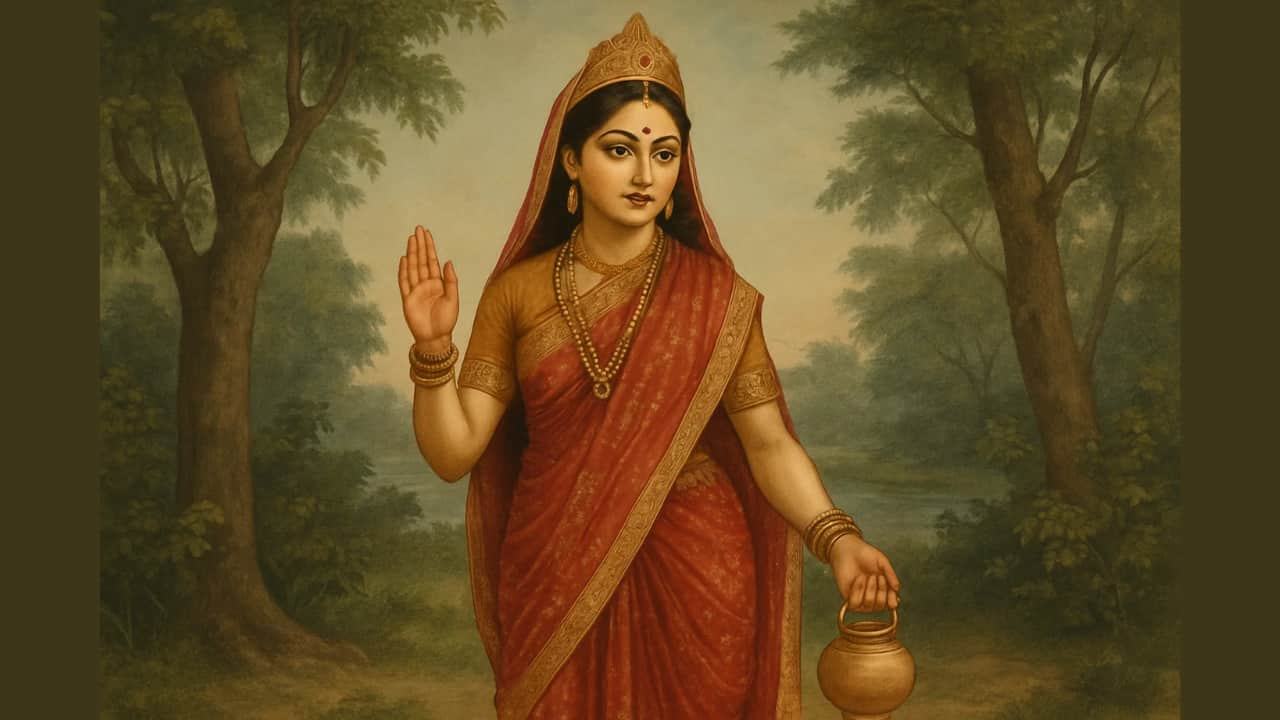
A Woman Who Challenged Death
In the vast tapestry of Indian mythology, where gods wage wars and sages shape destinies, there exists a quieter tale, one that does not rely on divine weapons or cosmic battles.
It is the story of Savitri, a woman whose strength lay not in physical might but in unwavering love and spiritual clarity. Her journey is one of devotion, wisdom, and the courage to walk beside death itself.
Savitri, the princess who chose her husband knowing he was fated to die, followed Yama, the god of death, and through grace and intellect, reclaimed life. Her tale is a luminous thread in the fabric of dharma, reminding us that the soul’s resolve can bend even the laws of fate.
Savitri's Origins and Character
Princess of Wisdom and Radiance
Savitri was born to King Ashwapati after years of intense penance and prayers to the gods. She was not merely a royal child; she was a divine gift, radiant in beauty and profound in wisdom. Her name, derived from the sun god Savitr, symbolized clarity, truth, and spiritual brilliance.
From a young age, she was immersed in Vedic teachings, philosophy, and meditation. Unlike other princesses, she was not drawn to luxury or power. Her strength was inward, her grace quiet, and her presence serene. She was the embodiment of feminine dharma, gentle yet unshakable.
The Choice of Satyavan
Love Beyond Fate
When the time came for Savitri to choose a husband, she embarked on a journey through forests and hermitages, seeking not wealth or status, but a soul that resonated with hers. She found Satyavan, a noble and virtuous man living in exile with his blind father.
The sages warned her, Satyavan was destined to die within a year. But Savitri’s love was not deterred. She saw beyond the shadow of death and chose him with full awareness.
Her decision was not impulsive; it was rooted in dharma, in the belief that love, when pure, is stronger than fate. She married him, knowing that every day was precious, and every moment a prayer.
Life in the Forest
A Year of Devotion
Savitri’s life with Satyavan in the forest was marked by simplicity and service. She embraced the austere lifestyle with grace, caring for her in-laws, gathering herbs, and tending to the land. Her days were filled with quiet rituals, her nights with meditation. She did not mourn the future; she lived fully in the present.
Each sunrise was a gift, each sunset a reminder of impermanence. Her devotion was not dramatic; it was steady, like the river that flows without pause. She prepared herself spiritually, knowing that the day of reckoning would come, and she would need more than tears to face it.
The Final Day
The Foretold Moment
On the destined day, Satyavan went into the forest with Savitri by his side. As he chopped wood, he suddenly collapsed, his life slipping away.
Yama, the god of death, appeared to take his soul. But Savitri did not scream or resist; she followed. She walked behind Yama, step by step, through realms unseen. Her resolve was silent, her presence unwavering.
She did not plead; she conversed. Her love was not possessive; it was purposeful.
She knew that to reclaim Satyavan, she had to appeal not to emotion, but to cosmic law.
Dialogue with Yama
Wisdom as Weapon
Yama, impressed by her devotion, offered her boons, anything but Satyavan’s life. Savitri asked for her father-in-law’s sight to be restored, her father’s kingdom to flourish, and children of her own. Yama granted each wish.
Then came her final request: “How can I have children without my husband?” Yama was forced to return Satyavan’s life since he was bound by his own word.
Savitri’s victory was not won through defiance; it was earned through wisdom. Her dialogue was a dance of dharma, where each word was measured, each request layered with meaning.
The Power of Speech- Graceful Persuasion
Savitri’s conversation with Yama is one of the most profound exchanges in mythology. She did not argue; she reasoned. Her speech was gentle yet firm, respectful yet insightful.
She reminded Yama of his own duties, of the balance between justice and compassion. Her words were not weapons; they were offerings of truth.
In her grace, she revealed the power of feminine intellect, showing that clarity and calm can move even the gods.
Symbolism and Strength
Themes of the Tale
Savitri’s story is rich with symbolism.
- Her love was her strength, not a weakness.
- Her wisdom triumphed over force.
- She walked with death and did not flinch.
- She honored destiny but shaped her own path.
- Her silence was her shield, her speech her sword.
- She is a reminder that dharma is not rigid; it is compassionate, adaptable, and luminous.
Legacy and Ritual - Vat Savitri Vrat
Across India, women observe the Vat Savitri Vrat, fasting and praying beneath banyan trees for the longevity of their husbands.
The banyan, with its deep roots and expansive branches, symbolizes endurance and shelter, qualities that Savitri embodied. Her story is not just remembered, it is lived.
In every ritual, in every vow, her spirit is invoked.
Cultural Impact - A Living Ideal
Savitri is more than a mythological figure; she is a cultural icon. Her tale is taught in schools, recited in homes, and revered in temples.
- She represents the ideal of marital devotion, but also the power of choice and the dignity of spiritual strength.
- She is a role model not just for wives, but for anyone who seeks to live with integrity and courage.
Modern Resonance
A Symbol for Today
In today’s world, where relationships are often tested by uncertainty and change, Savitri’s story offers timeless wisdom.
Her courage, patience, and clarity are qualities that transcend eras. She reminds us that love is not passive; it is active, wise, and enduring. Her journey is a guide for those who face loss, fear, or doubt, showing that the soul’s light can pierce even the darkest night.
The Triumph of Will

Savitri’s tale is a hymn to inner strength. She teaches that love, when pure and purposeful, can challenge even cosmic laws. Her journey is not just a myth; it is a mirror. In every woman who stands firm, in every soul that chooses love over fear, Savitri lives.
- She is the light in the forest, the voice beside death, and the will that never wavers.
Her courage redefines destiny, proving that devotion is not passive; it is powerful. Savitri’s unwavering resolve reminds us that even in the face of divine decree, the human spirit can rise, question, and transform fate.
Her story is a timeless call to stand for love, truth, and the sacred bond that transcends mortality.

